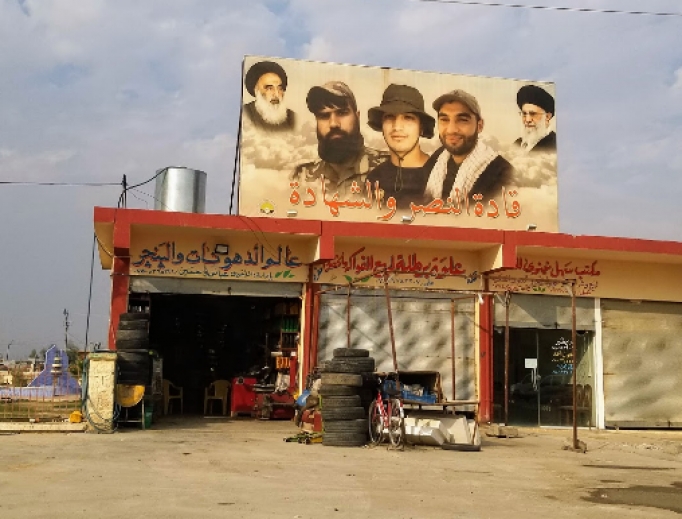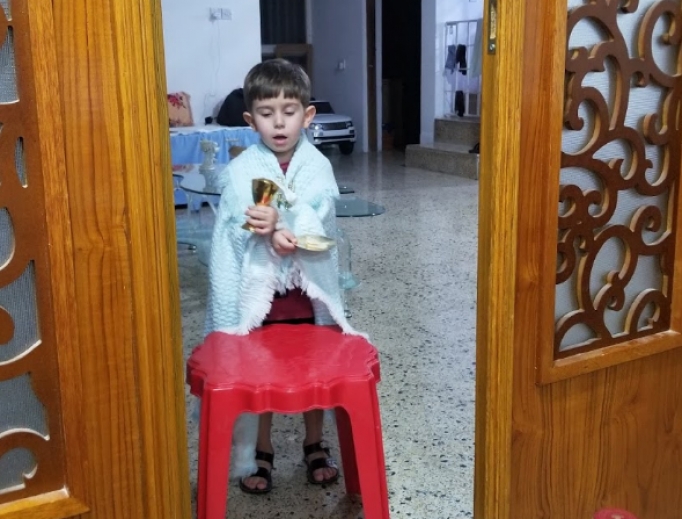First ISIS, Then Iran: How Iran Terrorizes Some Iraqi Catholics
COMMENTARY: Part II — Iraq’s largest Catholic town is fully encircled by an Iran-backed militia. In the context of worsening U.S.-Iran relations, some locals are afraid Iran’s impact on their lives will worsen.

In the chaos of the last few weeks of news from the Middle East, you’d be forgiven for missing a smaller, more routine story.
On Jan. 20, three French nationals and one Iraqi Catholic went missing in Baghdad. In itself, disappearances, which have actually accelerated since the October protests, are not news in Iraq.
What was different, here, though, is that all four were employees of a Catholic nongovernmental organization working in the Middle East, SOS Chrétiens d'Orient. One was an Iraqi from Qaraqosh, Iraq’s largest Catholic city. The worst-case scenario would be kidnapping by a Sunni jihadist group; a better-case scenario would be kidnapping by an Iran-backed Shia militia, who might have a political motive. On March 26 came the news of their release.
Either way, the incident points to a worsening situation for Christians in Iraq and the deleterious role of Iran in the country. Today, Baghdad and Mosul are overrun by Shiite paramilitary groups who receive funding and weapons from Iran. These groups helped defeat ISIS, but, two years after the group’smdefeat, they refuse to move on, even at the prime minister’s request. At this moment, thousands of Christians in Iraq live under their influence, including in Tel Keppe, the former center of Chaldean Catholicism in Iraq, as well as Bartella, the current center of Syriac Orthodoxy in Iraq.
These towns are in the Nineveh Plains, a region near Mosul that constitutes the historic homeland of Assyrians, Chaldeans and Syriacs. Today, ISIS remains in the area, but a more immediate threat to the local population comes from Iranian influence.
Flanked by Iran
Most of the Nineveh Plains region is influenced by two Iran-backed militias: the Shabak militia, which serves the interests of the Shabak, another ethnic minority in the region, and the Babylon Brigade. Both receive substantial financial and military backing from Iran and were accused of human-rights violations by the U.S. government in July 2019.
Rami Esa Saqat, 26, a Syriac Catholic and recent graduate of the University of Mosul, lives in Qaraqosh. “We live in constant fear of being attacked by the Iran-backed militias,” he said. “Over a long period of time, much trouble has been caused by the militias.”
Especially in Bartella, which has transitioned from exclusively Syriac to majority Shabak in the space of a few years, Christians accuse these militias of extorting Christian business owners, installing Shia monuments in front of Christian ones, damaging and looting Christian homes to prevent resettlement, charging arbitrary customs fees, threatening clergy, and tolerating crime against Christians, especially sexual assault. Sunni Arabs — a minority of whom welcomed ISIS — are subject to even worse treatment by these Shia groups, including forced disappearances.

This tribute to Shiite martyrs in the war against ISIS was recently erected in Bartella,
a town that used to be exclusively Christian but is now majority Shabak. Iran’s notorious Ayatollah Khomeini features in the left-hand corner.
“Through the militias, Iran wants to control administrative processes: the ID office, the taxi office, the property office,” one politician told me.
Rumors abound that Iran, through these militias, finances up to 50% of the sale price of Christian homes, to effect demographic displacement. (The endgame for Iran is not only cultural but also military. If Iranian-backed militias control this region, Iran can smuggle goods and weapons to its allies in Syria and Lebanon.)
Tensions in Bartella are high. Green Shiite flags fly from every Shabak house, making the demographic transition countable. Wild rumors fly. Christians wonder if imams are instructing their believers to boycott Christian shops. The Shabak, meanwhile, complain of treatment as second-class citizens by Christians.
The League of the Righteous, an Iran-backed political and military organization, holds an office in Bartella. In 2019, it was linked to both attacks on anti-government protests and the December attack on the U.S. Embassy in Baghdad. Shortly thereafter, on Jan. 3, it was designated a foreign terrorist organization by the United States. In recent years, the league and its allies have been accused of forcibly taking homes from Christians in Baghdad for political headquarters.
The stakes, however, are higher in the larger population centers of Qaraqosh and Karamless, two almost-exclusively Catholic towns that are fully surrounded by the Shabak Militia. They fear becoming the new Bartella — practically emptied of Christians and controlled by Iran.
Although Qaraqosh has its own Christian militia, the Shabak Militia has made no secret of its desire to control Qaraqosh, which it almost did in 2017, had the local bishop not phoned the Iraqi prime minister, who subsequently took measures to prevent the planned takeover.
Theocracy vs. Democracy
In the context of escalating U.S.-Iran tensions, the fact that a third of Iraqi Christians either live under the control of or are surrounded by Iran-backed militias takes on additional meaning. Although most Iraqi Christians are frustrated by the foreign influence exerted by both the U.S. and Iran on their country, many note that Iran is an Islamic republic and the U.S. is not. Such a difference is most obvious in the theocratic culture of Iran, which forces Christian women to wear the veil, has banned alcohol and bans conversion from Islam.
Like some other Christians, Saqat backs the U.S. presence in Iraq and was worried to hear about the attack on the U.S. Embassy in Baghdad. “Their presence ensures our existence as Christians in Iraq and prevents more chaos,” he said, adding that he was particularly glad to hear about Soleimani’s assassination.
“We started feeling happy,” Saqat said, “since his death may serve to disrupt and minimize, if not end, the militias backed by Iran.” Still, while he doesn’t think a war between the U.S. and Iran is likely, he’s noticed that checkpoints have cracked down recently, “hindering our activities.”
If there were a war, minorities would be disproportionately impacted — as they have in Iraq’s previous conflicts. “Christians, as minorities in Iraq, are more likely to leave the country,” Saqat told the Register. Not only are they targeted by Islamist groups, he said, but “Christians are viewed as being close to America because they are of the same religion.”
The relationship, however, of Christians to Iran is a complicated one. Prominent Christian leaders are sometimes photographed on social media with Iran-linked leaders — an uncomfortable reminder that some level of accommodation is needed with the prevailing powers.
Christian Disunity?
The most bizarre twist in this relationship is that one of Iraq’s most high-profile Iran-backed leaders is a Catholic: Ryan Al-Kaldani, who speaks Aramaic and hails from the exclusively Catholic town of Al-Qosh. He runs the Iran-backed Babylon Brigade, mentioned above, and his mostly Shiite troops have been accused, ironically, of preventing the resettlement of Catholics in Batnaya.
Although condemned by Chaldean Catholic Patriarch Louis Sako, he cultivates a personality cult as an Iran-backed Christian — frustrating many with his displays of piety. He said he can’t help it: “When I asked the Americans for weapons and missiles, they said that they would need the approval of the U.S. Congress. When I traveled to Iran, the [Iranian government] sent the weapons in less than 15 hours.”
The above political division is symptomatic of broader disunity among Christians in Iraq. A brief visit to Christian towns gives an impression of heroism: priests leading reconstruction committees, outspoken bishops pleading for the fate of their people, children speaking of forgiveness for ISIS in viral videos, and a culture in which the Church underwrites all activities: education, sport, theater and music.

Catholicism is deeply ingrained in local families. Here, the grandson of a local Catholic priest plays “Mass.” In Iraq, Catholic priests can marry and have children.
This picture of Christian heroism is true, and the Catholic world rightly looks to Iraq for its modern-day martyrs, but no one is superhuman, even in biblical lands. (Christians live close to the Nineveh of the Bible.) The Church is less, not more, united than it was before ISIS. Christians argue about reconstruction and about annexation into Kurdistan. Some laity resent the Church’s pervasive control of non-religious life, or blame the Church for not distributing aid equally. Many priests, who are often the only remaining members of their family in Iraq, are saints. Others are just men, who, by a twist of fate, find themselves expected to coordinate a response to the 21st century’s most wicked terrorist organization. Most are overworked and traumatized.
Success Within Reach
In reality, while taken together these problems may seem overwhelming — but taken individiually they are not insurmountable: disbanding militias, limiting Iran’s influence, granting some measure of political autonomy to the Nineveh Plains, a referendum of Kurdistan’s claim to the area, and a rapprochement with Sunni leaders are all within practical reach of success.
The Nineveh Plains has many talented Christians who have chosen to stay in the hope of salvaging their culture. With the recent non-sectarian protests demanding an end to corruption and foreign influence in Iraq, there may be no better time for optimism than in the past 17 years.
This article is the second in a series on Catholics in Iraq.
Xavier Bisits is a management consultant based in Washington, D.C., who previously worked in Iraq.
In no way is this article related to, informed by or endorsed by his employer. Some names in this article are pseudonyms.
















